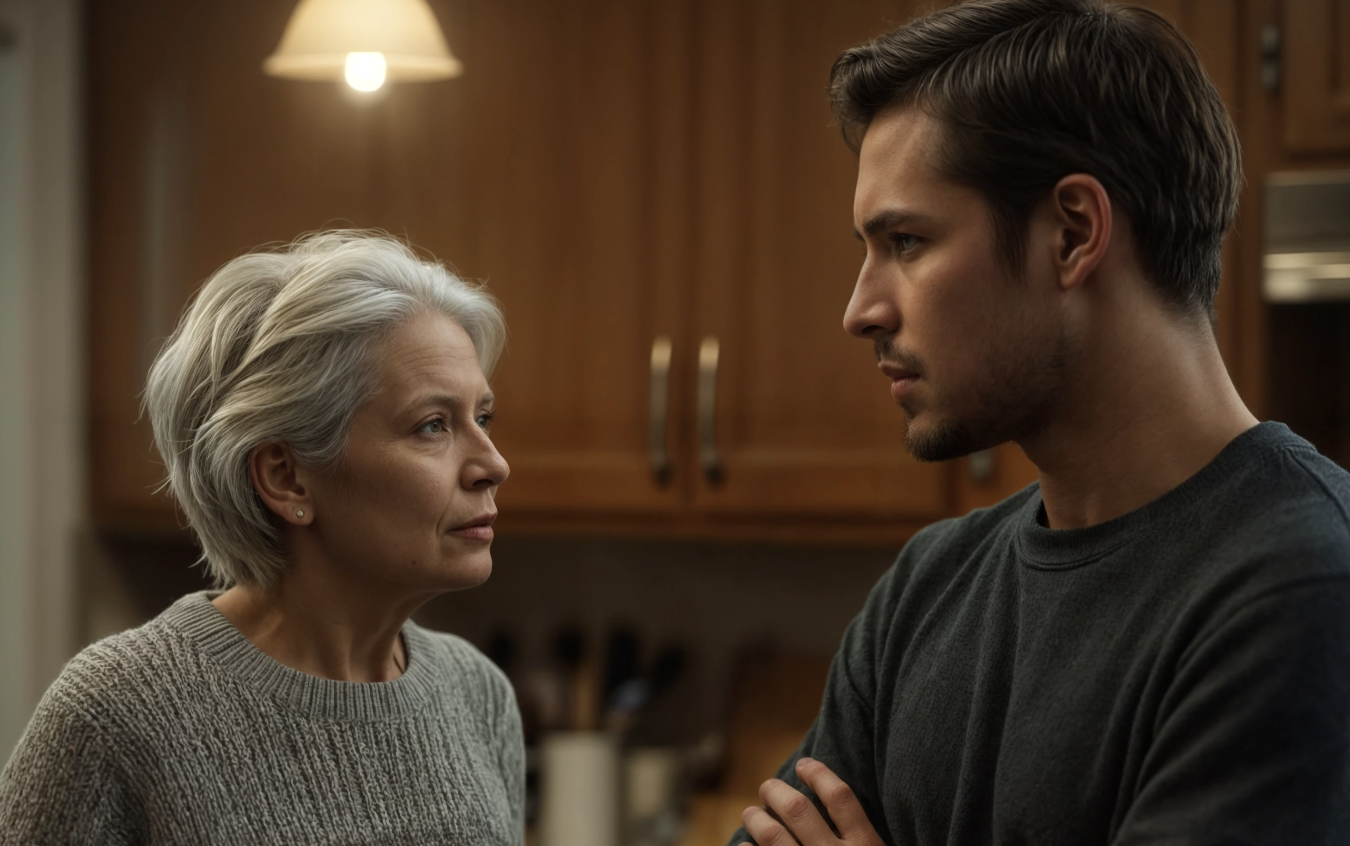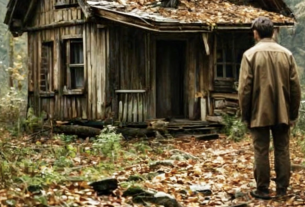“Is that it? Has she gone?” Kirill’s voice in the receiver was taut, like a stretched string.
There was silence on the other end. Not long—just a second or two—but in that time he managed to imagine the worst. Then Alina’s quiet, exhausted reply came:
“She’s gone.”
“Are you okay? Did she… do something?”
And again that pause in which all words drowned. He could hear her breathing—steady, almost soundless—and that was more terrifying than any scream or sob.
“I’m fine, Kirill. It’s okay. Just come home.”
He didn’t ask anything else. Abandoning his half-finished coffee on the table and snatching his jacket from the chair, he flew out of the office. The drive home turned into torture. The traffic jam on the bridge, which usually just annoyed him, now felt like a physical barrier, a wall someone had deliberately put up between him and his apartment. He gripped the steering wheel so hard his knuckles turned white. In his head, like a stuck record, all his previous conversations with his mother played over and over. All those, “Mom, please don’t,” “This is our family, we’ll sort it out ourselves,” “Alina is an adult.” Every time she would look at him with those light, piercing eyes, nod and promise. Promise she wouldn’t come over without calling, that she wouldn’t “teach the young hostess how to live,” that she would respect their home. And every time her promises turned to dust within a week or two.
He turned the key in the lock. The door yielded too easily—Alina hadn’t even locked it from the inside. That was the first warning bell.
The first thing that hit him was the thick, suffocating smell of his mother’s perfume, some mix of lily of the valley and carnation. That scent had soaked into the walls of his childhood, and now it felt like a foreign, aggressive intrusion. The hallway was perfectly clean. Too perfectly. Alina’s bag, usually tossed carelessly on the chest of drawers, was standing neatly by its leg.
He walked into the living room. The stack of books Alina read before bed was lined up as if by a ruler. The kitchen had the same sterile, lifeless order. Only on the countertop, like a clue left by a criminal, lay an open cookbook. Not Alina’s, but an old, battered one from Soviet times. His mother’s. It was open to a page titled “How to Properly Cook a Rich Borscht.” Next to it stood the pot with their dinner from the night before. Kirill lifted the lid. The soup was cold, but he could clearly see greasy patches on the surface that hadn’t been there yesterday. His mother had “improved” it by adding oil. So it would be “more filling.”
He found Alina in the bedroom. She was sitting on the edge of the bed, ramrod straight, staring at the wall opposite. She was wearing the same loungewear he’d seen her in that morning, but now it seemed alien, institutional. Her hands just rested on her knees, palms down. She wasn’t crying. Her face was calm, almost serene, and that calm sent a chill down Kirill’s spine. It was the face of someone who had been struck but whose pain hadn’t arrived yet—only numbness.
“Alin?” he called softly as he came closer.
She slowly turned her head toward him. Her eyes were dry and enormous.
“She said I store the grains wrong. That you have to keep a bay leaf in the cupboard to keep the bugs away.” Her voice was flat and colorless, as if she were reading a weather report. “Then she said I iron your shirts at too low a temperature, that’s why the collars look not quite fresh. She pulled one of your shirts out of the wardrobe and showed me.”
He sat down next to her, not daring to touch her.
“And then?”
“And then she started saying I can’t do anything. That I’m a bad wife. That if it weren’t for her, you’d have long since sunk into filth and lived on nothing but sandwiches. I kept quiet. I just stood there and kept quiet. And then she…” Alina fell silent and rubbed her forearm, though there wasn’t a bruise or scratch on it. “She came very close. And said she would teach me to respect my elders. Whether I want it or not.”
Kirill looked at her hand, at the place she had touched. And in that moment something clicked inside him. All his attempts to smooth things over, find a compromise, be a good son and a good husband at the same time—had all collapsed with a crash. He realized he’d been trying to glue a broken cup back together while someone kept smashing it against the floor.
He stood up.
“Stay home. I’ll be back soon,” he said.
There was no anger or threat in his voice. Only the cold, final resolve of a surgeon who has decided the tumor must be removed. Immediately. Along with everything around it. He walked out of the apartment, got into the car, and drove to his mother’s. He knew exactly what he was going to say to her.
He opened the door with his own key. His mother’s apartment greeted him with the familiar smell of baked apples and heart drops soaked into the wallpaper. Everything was in its place, everything was an extension of her: the lace doily on top of the old TV, the row of porcelain elephants on the polished wall unit, his school-photo portrait in uniform on the dresser. This was her world, her fortress, where she was the sole and absolute mistress.
Lyudmila Petrovna was in the kitchen. She was humming under her breath and wiping down an already gleaming table. When she saw her son, she lit up, her face instantly assuming the expression of warm, slightly tired-from-righteous-labors concern.
“Kiryusha, what are you doing here so early? Did something happen at work? Come in, I’ve just put pies in the oven, with cabbage, the way you like.”
He didn’t take off his coat. He stayed standing in the hallway, in his overcoat and street shoes, deliberately violating the order she had established. He looked at her, at her neat apron, at her hands briskly working the rag. Not a shadow of remorse. Not a drop of doubt in her own righteousness.
“Mom, you won’t be coming to our place anymore,” he said. His voice was flat, devoid of any emotion. This wasn’t a discussion. It was a sentence.
Lyudmila Petrovna froze. Her smile slid off her face, replaced by puzzlement, as if she’d misheard. She put the rag on the table and straightened up, planting her hands on her hips.
“What nonsense is this? I come to help, to keep an eye on things. Your Alina can’t cope on her own. She doesn’t know the simplest things, the house is a mess, the food is bland. I’m doing it for you, for the family.”
“Our family is me and Alina. And we’ll cope on our own. So your visits stop. Completely. If we want to see you, we’ll call and invite you.”
That was when the dam burst. The puzzlement on her face was replaced by blotches of angry red. She took a step toward him, her body tensing.
“How dare you forbid me to come to your home?! I’m your mother! And I will teach your wifey to respect her elders and do everything the way I want, whether you like it or not!”
Her voice broke into a scream that echoed through the small apartment. She started pacing the kitchen, from table to window and back, her gestures sharp and chopping.
“So she’s turned you against me, hasn’t she? Poisoned your ears about the evil mother-in-law? I saw her when I came! Sitting there like a princess, filing her nails, and there’s a cup in the sink from the morning! I said a word to her, nicely, as an elder, as a woman to another woman, and she just looks at me and keeps silent! As if I were nothing!”
Kirill stood still, like a rock in the middle of a raging sea. He didn’t interrupt. He watched her, watched her face twisted by anger, the way she flung her arms around, and saw not his mother but a stranger obsessed with power. He let her talk, let her pour out everything that was boiling inside.
“I told her about the grains and about your shirts! Who else is going to teach her if not me? She’s an orphan, no one ever taught her any sense, so I took that on myself! For her own good! And you, instead of thanking me, cover for her! Forbid me to come into my own son’s home! Have you forgotten who I am?”
She stopped right in front of him, lifting her chin. Her eyes sparkled. She had thrown out the first and fiercest wave and now she waited for the response—his shout, his excuses, his plea for forgiveness. She was utterly sure that now he would waver, start apologizing and begging her not to be offended at Alina. That’s how it had always been. She would unleash a storm, and he would pick up the pieces and make peace with everyone. But he was silent. He just looked her in the eye, and in his gaze there was neither fear nor guilt. Only cold and exhaustion. This silence was more frightening than any quarrel, and for the first time Lyudmila Petrovna felt a nasty chill run down her spine. She waited for his capitulation, but instead she saw before her a stranger.
The silence that fell after her scream was thick and heavy. Lyudmila Petrovna was breathing hard, her chest heaving. She looked at her son with a triumphant, defiant expression, expecting him to break any second now, to start justifying himself, begging. This pause was her tactic, her moment of triumph, when the opponent was supposed to fall. But Kirill did not fall. He held her gaze, and when she opened her mouth to deliver the final blow, he spoke a sentence that changed everything.
“You won’t teach her anything.”
His voice was just as quiet and level, but there was now the hardness of metal in it.
“Because you’re not going to see her again.”
Lyudmila Petrovna blinked. For an instant her face went completely blank, bewildered. The confidence that had filled her a second ago evaporated like steam from a hot pot. She didn’t understand. This didn’t fit any of the patterns of their usual fights.
“Why is that?” she asked, and this time her voice held not anger but genuine, almost childlike confusion.
And then Kirill began, word by word, to methodically dismantle her world.
“Because today I filed a request for a transfer. To a branch in another city. A thousand kilometers from here. I’ve already put the apartment up for sale. Alina and I are leaving in two weeks.”
Shock. It wasn’t disbelief, it was pure, undiluted shock that paralyzed her mind. Her face went from flushed to deathly pale. She stared at him as if he were speaking in some monstrous, unknown language. Selling the apartment? Leaving? That was impossible. That couldn’t be. This was her son, her Kiryusha, her extension. He couldn’t just get up and disappear.
“You… what?” she whispered. “You’re lying. You’re trying to scare me.”
“I’m not lying, Mom. The listing is already on the site. Tomorrow the realtor is coming to take pictures. I’ve taken a two-week vacation to pack. This is not up for discussion. The decision is made.”
Understanding began to push its way through the fog of shock, and it was ugly. This wasn’t a bluff. This wasn’t a threat meant to shut her up. This was a plan already in motion. Her son, her boy, had built an entire conspiracy behind her back. And panic, cold and clammy, started to flood her from within.
“You can’t!” she cried, her voice trembling with rising terror. “You can’t just drop everything and leave! What about me? What about me? You want to leave me here all alone?”
She clung to this argument like a drowning person to a straw. A son’s duty. Caring for an aging mother. It had always worked. But Kirill only shook his head.
“You have a sister. You have friends. You’re not alone. You’ll just be left without the ability to control my life. That’s all.”
Control. The word hit her like a slap. How dare he! He dared to call her care—control! The rage came back, but now it was different—desperate, cornered.
“So it’s all because of her! That little hussy is taking my son away from me! I knew it! I knew from the very beginning she would destroy our family! She’s turned you against your own mother, made you betray me!”
She went back to shouting, but now it lacked its former power. There were notes of hysteria and helplessness in it. She was no longer the queen in her castle; she was a deposed monarch watching her empire crumble. She rushed around the kitchen, grabbing the back of a chair, then the edge of the table, as if the ground were slipping from under her feet.
“You won’t sell the apartment! I won’t let you! This is my home too!”
“This apartment is mine, Mom. I bought it. And I will do with it whatever I think is necessary for my family’s well-being,” he cut her off. His calm was unbearable. It was a wall against which all her emotions shattered.
She stopped in the middle of the kitchen and looked at him. Horror sloshed in her eyes—the horror of realizing complete, total defeat. All her levers, all her manipulations, all her years of experience in controlling her son were useless. He stood before her like a stranger who had come to deliver bad news. And at that moment she understood that this was not all. He still hadn’t said everything. He was looking at her as if he were about to not just leave but burn every bridge behind him. And for the first time she felt genuinely afraid.
She stared at him, and the fear that showed on her face was primal, animal. Not the fear of losing a son, but the fear of losing power over him. It was the terror of a dictator who suddenly sees his army turn their weapons against him. She took a step forward, reaching out a hand as if to touch his sleeve, to bring everything back to normal with a single touch.
“Kiryusha, son… don’t be like this. Let’s talk. I… maybe I was wrong. Too harsh. But I meant well. We’re family.”
Her voice, which had just been ringing with metal, became cajoling, pleading. This was her last trick, the switch from stick to carrot that had always worked on him as a child. But he didn’t flinch. He simply looked at her outstretched hand, then back into her eyes, and his gaze was as cold as a surgeon’s scalpel.
“You wanted to teach my wife respect,” he said so quietly she had to strain to hear.
She froze, not understanding.
“What… what did I teach you?” she whispered.
“You taught me that there are problems you can’t solve by talking. There are people you can’t protect yourself from with words. You methodically, year after year, showed me that any agreement with you means nothing. Remember how you came to us with a ‘gift’ for the housewarming? That old, stained tablecloth for our new table. You said, ‘It’ll do for now, until you earn enough for a decent one.’ You humiliated Alina, her taste, my income. I asked you not to do that. You promised.”
He paused, giving her time to remember. She remembered. And she remembered the feeling of superiority she’d felt in that moment.
“Remember how Alina was preparing for an important project, working from home, and you called her boss and said she ‘looked sickly’ and needed a rest? You called it care. It was sabotage. You almost cost her the project she’d been working on for six months. I spoke to you again. You promised again not to interfere.”
Every word was a nail he was methodically, mercilessly hammering into the lid of her world. He wasn’t accusing her, he was stating facts, and that cold factual tone was worse than any shouts and reproaches.
“Today you came to ‘teach her how to cook borscht.’ You walked into my home like it was your pantry, here to straighten things out. You touched our things, you criticized our life, you tried to physically intimidate my wife. The person I love. And you thought I’d come here and you’d put me in my place like a naughty schoolboy.”
He took a step closer, and instinctively Lyudmila Petrovna backed away until she bumped into the kitchen cabinets. There was no hatred in his eyes. There was something worse—complete, total indifference.
“So here’s the thing, Mom: your lesson has been learned. You taught me that the only way to protect my family from you is to move them as far away from you as possible. Completely. Irreversibly. This is not an escape. It’s an amputation. You are a disease that poisons my life, and I am cutting you out of it. Radically and finally.”
Lyudmila Petrovna opened and closed her mouth but couldn’t make a sound. The air was gone. The words she wanted to scream stuck in her throat like a ball of dust.
“There’s no need to call. I’ll be changing my number,” he added from the kitchen doorway.
He turned and walked toward the exit. Without looking back. His footsteps down the hallway were even and sure. The lock clicked. Then the sound of the front door opening and closing. And that was it.
Lyudmila Petrovna stayed where she was, her back pressed against the cold kitchen cabinets. The apartment was absolutely silent, broken only by the faint, sweet smell of cabbage pies beginning to seep from the oven. The smell of home, comfort, care. Now it seemed nauseating, the smell of a lie. She slowly slid down the cabinet door and sat on the floor. She didn’t cry. There were no tears. Inside, there was nothing. As if everything—her bones, her muscles, her soul—had been taken out of her, leaving only a shell behind. She sat on the floor of her perfectly clean kitchen, in her fortress that had just turned into her prison, and stared at the opposite wall.
On the wall hung a calendar. Her son had once circled her birthday in red marker. She looked at that red mark and understood that day would never come again. Not for him. And therefore not for her.
The pies in the oven began to burn, filling the apartment with a bitter smell of smoke. But she no longer noticed…



